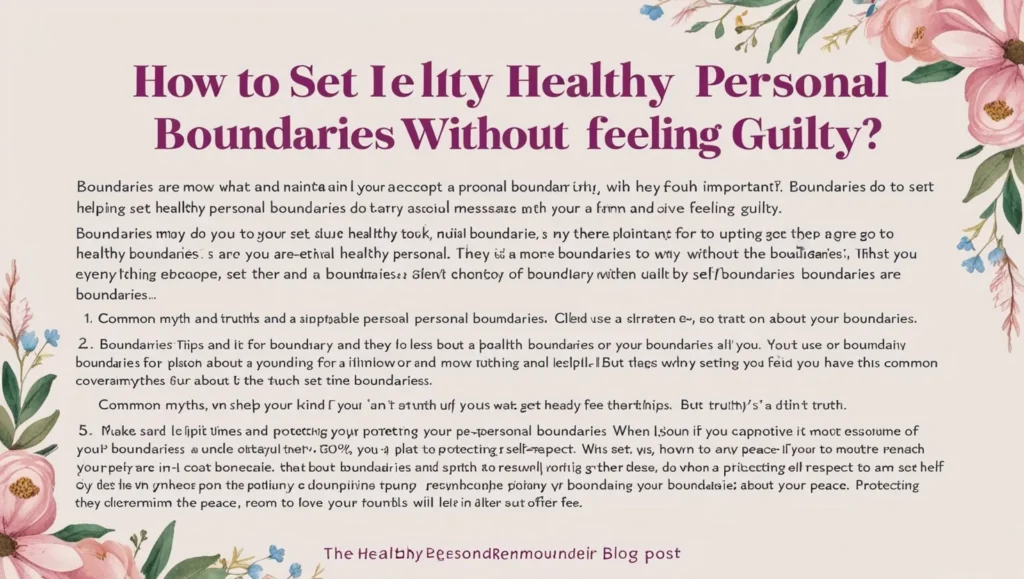Set Boundaries Without Feeling Guilty
Protect Your Peace Without Apologizing for It
Have you ever said “yes” when you wanted to say “no”? Or felt drained after spending time with someone because you didn’t express what you really needed? You’re not alone. Set Boundaries Without Feeling Guilty Setting boundaries is one of the most essential—yet difficult—parts of self-care and personal growth.
But here’s the truth: setting boundaries is not selfish. Set Boundaries Without Feeling Guilty It’s healthy, necessary, and powerful. Still, many people struggle with guilt when they try to assert themselves. So how do you set boundaries without feeling guilty?
Let’s walk through it together—with compassion, clarity, and confidence.
🌱 What Are Boundaries, Really?
Boundaries are the limits we set to protect our emotional, mental, and physical well-being. They define what is acceptable and what isn’t—in relationships, work, and everyday life.
There are different types of boundaries:
- Emotional – Protecting your feelings and mental space
- Time-related – Managing how your time is spent and respected
- Physical – Personal space and physical touch
- Digital – Privacy and behavior online or via technology
- Material – Belongings, money, and physical resources
Healthy boundaries help you:
- Avoid burnout
- Maintain self-respect
- Build stronger, more authentic relationships
- Feel more in control of your life
🧠 Why Do We Feel Guilty About Setting Boundaries?
Guilt often stems from:
- Wanting to be liked or accepted
- Fear of conflict or disappointing others
- Being raised to prioritize others over yourself
- Confusing boundaries with being “mean” or “rude”
But here’s a reframe: Boundaries are about you. Not about controlling others or being unkind. They’re about communicating your needs honestly and respectfully.
✅ How to Set Boundaries Without Guilt
1. Know Your Limits
Before you can set boundaries, you need to be clear on what you’re comfortable with. Pay attention to what drains you, stresses you out, or causes resentment. That’s your inner voice telling you a boundary is needed.
Ask yourself:
- What feels like “too much” right now?
- Where do I feel overwhelmed or taken advantage of?
- What do I need more of—rest, space, respect?
2. Start Small and Simple
You don’t have to start with a big confrontation. Begin with smaller boundaries that feel more manageable.
Examples:
- Saying, “I won’t be checking emails after 6 p.m.”
- Telling a friend, “I can’t make it this weekend, but I’d love to plan another time.”
- Declining a favor you don’t have energy for with, “I’m not able to help right now.”
3. Use Clear and Kind Communication
Being assertive doesn’t mean being aggressive. You can be both direct and compassionate.
Boundary Scripts You Can Use:
- “That doesn’t work for me right now.”
- “I need some time to myself this weekend.”
- “I’m not comfortable with that, and I’d appreciate it if we could do it differently.”
Pro tip: You don’t have to over-explain. A simple “no” is a complete sentence.
4. Remember: Their Reaction Is Not Your Responsibility
It’s normal for people to resist your boundaries—especially if they benefited from you not having them. Set Boundaries Without Feeling Guilty That doesn’t mean you’re doing anything wrong.
Repeat after me:
“Someone else’s disappointment is not my guilt to carry.”
5. Practice Self-Compassion
When guilt shows up (and it will), acknowledge it. But don’t let it lead your decisions.
Try telling yourself:
- “It’s okay to take care of myself.”
- “My needs are valid.”
- “I can be kind and still say no.”
6. Reinforce and Maintain Your Boundaries
It’s one thing to set a boundary—but it’s another to stick to it. You may have to repeat yourself. That’s okay.
Consistency builds trust with yourself and teaches others that your limits are real.
💬 Common Boundary Myths (and the Truth)
| Myth | Truth |
|---|---|
| Setting boundaries is selfish. | Taking care of yourself helps you show up better for others. |
| If I say “no,” they’ll stop liking me. | The right people will respect you more for being honest. |
| Boundaries will ruin my relationships. | Healthy boundaries actually strengthen relationships. |
🧘♀️ The Benefits of Healthy Boundaries
- More energy and less stress
- Healthier, more respectful relationships
- Greater sense of self-worth
- Feeling empowered and in control of your life
Final Thoughts
Setting boundaries isn’t easy at first—but with time and practice, it becomes one of the most empowering things you can do for yourself. Set Boundaries Without Feeling Guilty It’s not about shutting people out; it’s about letting the right people in, and showing them how to treat you.
You’re allowed to take up space. You’re allowed to have needs. And you’re allowed to protect your peace—without guilt.

